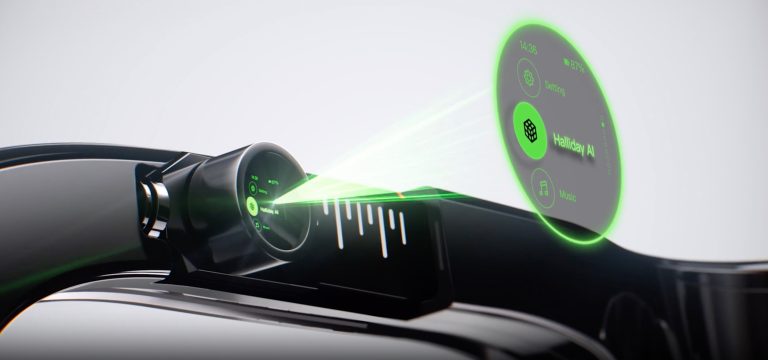A new wearable tech company is entering the fray. Halliday, a new startup, is set to shake up the wearable tech scene by combining smart AI features with stylish glasses that call upon the nostalgia of vintage designs. The company is showing off the glasses at CES this week, calling them the world’s first proactive AI smart glasses.
They’re expected to start shipping by the end of Q1 2025. These new glasses aim to do away with the need to put the display directly in the lenses of the glasses. Instead, it relies on what Halliday calls the “DigiWindow,” a near-eye display that projects a 3.5-inch screen into the wearer’s upper-right field of view.
Unlike other smart glasses, this display isn’t attached to the lenses. Instead, it’s connected to a tiny projector on the frame. This allows users to access information with minimal interference and without needing specific lenses. The company says that its proactive AI smart glasses work for people with or without prescription lenses and remain visible even in bright sunlight.
 Image source: Halliday
Image source: Halliday
What makes these glasses particularly interesting is the promise of Hallida’s built-in AI. Instead of waiting for commands, the company says the AI can analyze conversations and provide useful information on its own. Imagine being in a meeting and having key points summarized or complex questions answered without lifting a finger.
Tech. Entertainment. Science. Your inbox.
Sign up for the most interesting tech & entertainment news out there.
By signing up, I agree to the Terms of Use and have reviewed the Privacy Notice.
Halliday says the proactive AI can also handle real-time translations in up to 40 languages, give navigation directions, transcribe voice notes, and display synced music lyrics directly on the smart glasses’ display. Along with Google’s new smart glasses, Halliday’s offering could reinvigorate smart glasses for some.
Many of these features do require a Bluetooth connection to a smartphone, though. Additionally, Halliday hasn’t shared details on the specific AI technology powering the glasses. However, at just 35 grams, the Halliday Glasses are light enough for all-day wear and offer up to eight hours of battery life.
You’ll be able to control the proactive AI smart glasses using voice commands as well as buttons built directly into the frame. However, Halliday is also planning to ship a ring-like trackpad that you can wear on your finger to interact directly with the glasses.
Halliday’s proactive AI glasses mark a small step forward in wearable tech. It is intriguing to see a pair of smart glasses that don’t require special lenses for the display. However, based on the promotional material seen so far, it does look like the glasses will be pretty useless without the accompanying ring. That makes the glasses seem very much like a stopgap solution since eye and hand tracking is already a thing.
If that doesn’t bother you, then these proactive AI smart glasses could be a solid next step for wearable tech. Or, we could end up with yet another niche piece of tech claiming to be more useful than it actually is. I suppose only time will tell. For now, we don’t know too much, but Halliday plans to launch a Kickstarter, and the glasses will retail for $489—much more than some other competitors out there.

